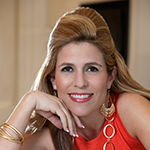Some people seem born to do what they do while others find their calling later in life. What was it like for you to become a lawyer?
When I went to Catholic school with nuns, they would inevitably pick on kids and I would open my mouth if I saw what I thought was unfair and get myself in trouble for it. I remember having to go home and write an essay on why I had unduly interfered and started arguing in someone’s defense. I ended up writing an essay not conceding my point, but apologizing for interfering. That’s just the way I was. Consequently, people always said, “You ought to be a lawyer.”
Where do you think that penchant for fairness and defending others came from?
Mine was a pretty rough-and-tumble childhood with eight siblings and a million cousins. I grew up kind of competitive and feisty. Even though I was the youngest, I developed this streak to stand up for others. I was always a tomboy and athletic and into contact sports. My brother used to teach me defense moves. One time he was giving my sister a hard time, and even though he was way older and bigger than me, I decided that wasn’t right, so I got in the middle and said, “Come on! You need to go through me before you get to her!” He could have swatted me like a fly, but I had it in me.
Can you remember your first experience with the legal field?
My father had a law practice, and growing up, I would go downtown and wait for him to finish work. He put me to work on an old Underwood manual typewriter typing up warranty clauses. I just got comfortable around the law—and I watched a lot of Perry Mason.
Where does your commitment to women’s advocacy stem from?
From an early age, I just had this intuitive sense that things weren’t fair—men had many more interesting opportunities than women did, and I wanted to change that. I remember writing a paper in ninth grade about The Scarlet Letter. I was so incensed that the woman was treated more harshly than the man. My teacher encouraged me to learn more about feminism and develop those ideas. I didn’t know there was a term for feminists, but I knew I was one.
What has been one of the greatest challenges of your career?
Legislative work and public policy are very male-dominated arenas. Consequently, it is a constant struggle to be heard and get a seat at the table. I was at a rally at the Texas capital recently to oppose a bill limiting women’s rights and it felt like déjà vu. We were fighting for the same women’s rights again in 2013. Some things never change. We recently increased the number of women in the US Senate to 20 and added a few more members in the House, but how long have we been clinging to these small percentages of women in positions of power? When I went to work at the Texas State Bar, Bill Whitehurst was president that year, and he hired me as the first Latina department head there. Progress has been made, but it has been slow and incremental.
How did you navigate those situations where you were the only woman or among just a few in your field?
My sister, Angie, who was a third-year law student when I was a first-year, was a great source of inspiration and support for me in school. I also had the chance to work for Irma Rangel, the first Mexican-American woman elected to the Texas House of Representatives. A lot of people took a step-aside-little-lady attitude with women at that time, and they found out that, while Irma was only 5’2”, she didn’t step aside for anybody. I respected that about her, and have always tried to emulate her and conduct myself in ways that command respect for what I do. She always saw in me more than I did myself and encouraged me to believe in myself. She also said that even though it wasn’t fair, as Latinas, we had to work twice or three times as hard so that’s what I did.
What has been the most meaningful or moving work you’ve done in your career?
I think the work I did to help draft and pass the first legislation in Texas addressing domestic violence. The legislation created the Temporary Protective Orders (TPOs), which are still in effect today as well as providing for state funding for domestic violence shelters across Texas.
Tell me about one of the most important lawsuits you and your law firm have handled.
It would have to be the banana workers toxic tort cases in Central America. We’re continuing to work on the second generation of those cases. Meeting these workers who have told me stories about their work, how they were exposed to this toxic chemical when they had no idea that the chemicals they were working with was harming them was really moving because I saw how their families had fallen apart.
What is the hardest part about working on a case like that?
Just seeing how their lives had been changed—these men had been sterilized, which greatly impacted their lives, especially in a Latin culture where a man’s virility is measured by the children he has.
I imagine most of the serious injury and wrongful death cases your firm handles have a compelling human component. How do you handle that?
Yes. In many of these cases we know our clients’ days are numbered because they’re suffering from terminal illnesses. We’ve lost a lot of clients during the process of taking on their mesothelioma cases and have continued to represent their widows and families. Sometimes it’s so frustrating because cases get dragged on and these clients are so sick. Monetary compensation is something, but you really can’t make these people whole. We hope to just provide some vindication and accountability for the injustice they’ve suffered and some solace that their families will be taken care of financially.
You have mentored a family of young women for years now. What drew you to a mentorship program, and how has the experience touched your life?
Irma used to say, “Look behind you and don’t shut the door. Make sure it’s open and help others through.” I found the mentorship program through the Hispanic Bar Association in Austin, and after having participated for a few years, one little girl just caught my eye. I went beyond what the program called for and started spending weekends with her and her siblings, and taking her to special events. I ended up mentoring her three younger sisters and youngest brother as well. I held the youngest sister’s hand as she signed her acceptance letter to a liberal arts academy, and when she cried because she was afraid to go, I told her about my own struggles in law school.
I also mentor young college women and young law students who I meet through the various organizations in which I am involved. Recently, I was on the advisory board for a women’s leadership program at the University of Texas and spent five days with young women working with them to develop leadership skills and encourage them to run for public office. It was so gratifying. I get as much out of that as they do.

